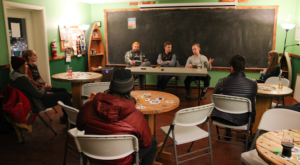By Katy Spence
 A lively Q&A followed the panelists’ remarks at Imagine Nation in Missoula.
A lively Q&A followed the panelists’ remarks at Imagine Nation in Missoula.
After being shelved by a global pandemic, MEIC has finally launched an ongoing event series in partnership with craft breweries, distilleries, and wineries. In our augural event in Missoula, attendees gathered to hear from Imagine Nation Head Brewer Sean Nevins, Clark Fork Coalition Legal Director Andrew Gorder, and MEIC Deputy Director Derf Johnson.
What do these folks all have in common? They all want clean water.
In 2020, Montana ranked third in the nation for the number of craft breweries per capita. Brewing (and drinking) are part of Montana’s culture, and it wouldn’t be possible without Montana’s clear, clean water.
Sean set the stage, emphasizing that water makes up 90-95% of a final, brewed beer. He described how important different facets of water are to the brewing process, and even how the final brew can be determined by characteristics of the water.
“It’s like the water chooses the beer, not the other way around,” Sean said. “Water quality, composition, and many of its other attributes and properties are often overlooked by amateur brewers and even a fair bit of professional brewers.”
Elements such as water hardness and pH can drive what beer is most successful with specific kinds of water. Sean said the Czech pilsners likely come from soft water, whereas Ireland’s harder water is better suited to dark and dry malts. Missoula’s aquifer is full of hard water, lending to the city’s flagship dark beers like Cold Smoke and Moose Drool. Luckily, the water is stable enough to make the brewing process predictable for Sean and the team at Imagine Nation.
Andrew Gorder zoomed out to talk about the Clark Fork watershed and ongoing projects like cleanup at Smurfit Stone. An ongoing threat to water quality and human and ecological health, the defunct Smurfit-Stone paper mill in Frenchtown is in need of serious cleanup and remediation, which the Clark Fork Coalition has been pushing forward since it was founded.
In addition, Andrew described the Coalition’s efforts to restore the Clark Fork watershed, which includes removing unnecessary berms in favor of an unfettered floodplain.
“Are we protecting the floodplains so that when rivers need to move, they can move?” Andrew said, noting that climate change and population growth are two of the biggest threats to Montana’s waterways.
Derf Johnson spoke about statewide policies that will impact water quality, such as the ongoing rulemaking for SB 358, which attempts to roll back water quality standards, or the looming threat of repealing Montana’s constitutional right to a clean and healthful environment.
Despite the uphill battle we face in the Legislature this session, Derf said that it’s important to stay tuned in and follow issues that could threaten our clean water. This includes getting to know your legislators and reaching out to them via phone, email, social media, and even in person.
“Believe it or not, the Montana Legislature is very accessible,” Derf said. “I would encourage you all to get engaged.”
Stay tuned for future A River Runs Brew It events in your community! If you run a brewery, winery, or distillery, or if you have a suggestion for a future partner, reach out to Katy Spence (kspence@meic.org) or learn more at www.ariverrunsbrewit.org.
This article was published in the Dec. 2022 issue of Down To Earth.

